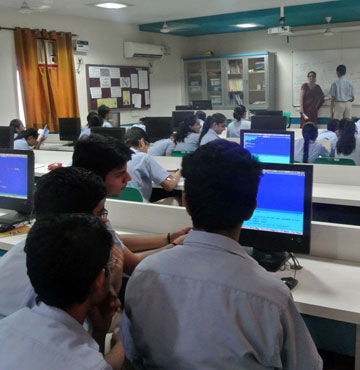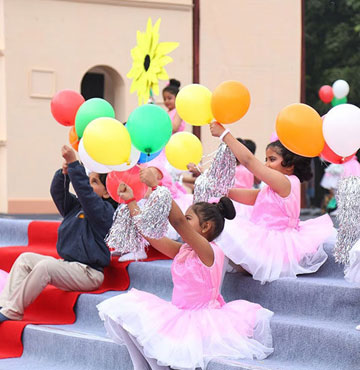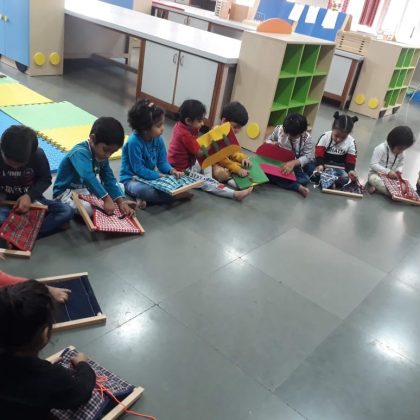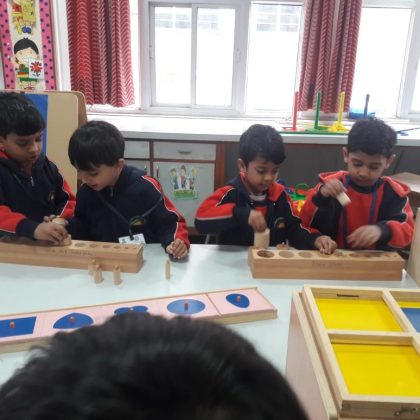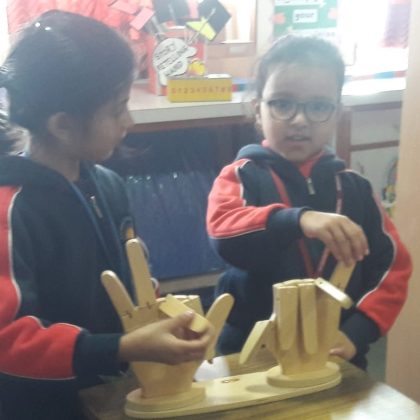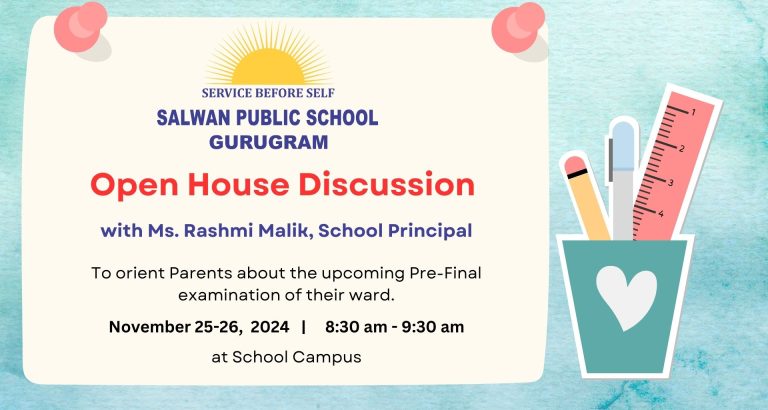Quality Education is the way of life at Salwan Public School. The school provides a conducive learning environment with state-of-the-art infrastructure and superlative facilities for the all-round development of learners.
School campus is spread in 5 acres plot divided in five blocks. The campus has been designed with utmost professional care to meet all requirements of scholastic and co scholastic activities. Each block has well lit class rooms with smart classes.

Library
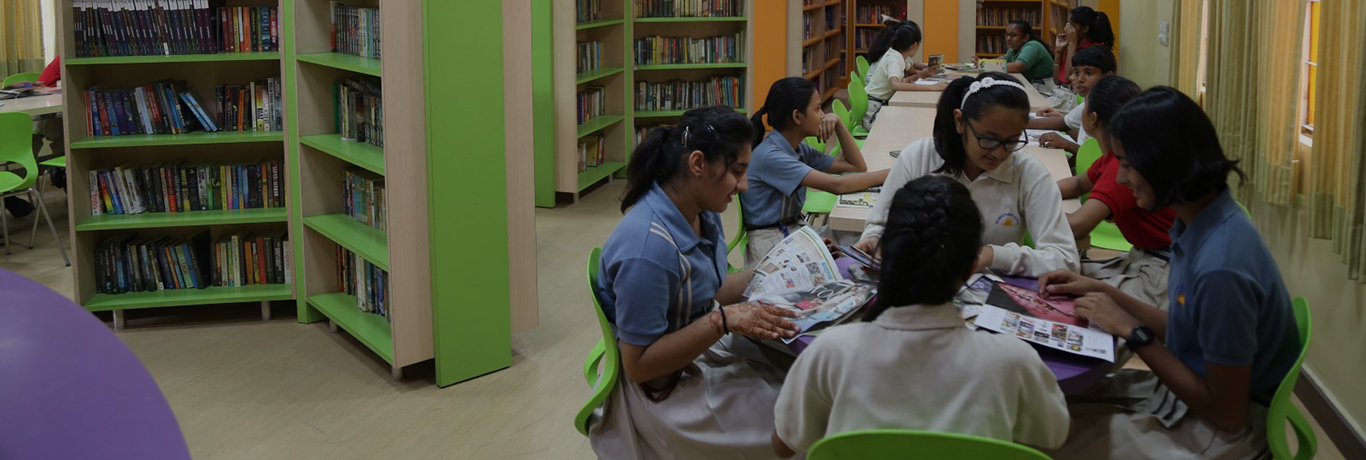


“Libraries store the energy that fuels the imagination. They open up windows to the world and inspire us to explore and achieve and contribute to improve our quality of life.” – Sidney Sheldon
A library is a paradise for students, opening the world of wisdom to them. It is like an island in the middle of a vast sea of ignorance. Recognizing the importance of libraries in students’ lives, our school libraries have been designed to provide dynamic and flexible spaces. These spaces are innovatively designed with best practices and research in mind, where students can explore and use various resources in different formats. The libraries are well-stocked with a wide collection of books and periodicals on various subjects, and are aimed at encouraging and promoting a love of reading among our students. The fiction collection is curated to meet all interests and reading levels. The libraries are also open to parents on the fourth Saturday of each month, from 9:30 am to 2:30 pm.
Library Programmes and Events:-
Every month, the library faculty organizes activities such as Storytelling, Book Talks, Bookmark Making, the Home Library Challenge, Face-a-Book Challenge, Quizzes, Book Fairs and Exhibitions, Book Reviews, Book Jacket Design, Show and Tell, Read-a-Story, Movie show etc.
Library Publications:-
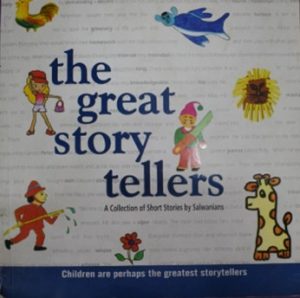
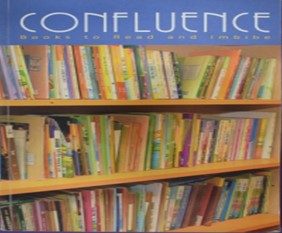
Confluence- We have compiled a set of books from different genres, reviewed them, and presented them as a collection full of diverse books. This compilation, named Confluence: Books to Read and Imbibe, consists of book reviews written by various faculty members of Salwan Public School, Gurugram.
The Great Story Teller- Children are perhaps the best storytellers and writers. They are not bound by conventions or definitions. The Great Storyteller is a platform for every child to unleash his or her creativity. It is a compilation of amazing ideas by children. Their efforts and results have truly enthralled us and made us feel proud to be associated with the proud Salwanians.
Contact– library-senior@salwangurgaon.com, library-junior@salwangurgaon.com
Laboratories
The school aims at providing enriching learning experiences to the students that fill their minds with curiosity, creativity and desire to discover. It also endeavours to keep them abreast with the advancement of technology and globalization. Our school labs, well equipped with the latest equipment provide experiential learning through hands-on and fun-filled activities. Students gain extensive practical experience by conducting experiments. Integrated with the academic structure, these labs provide a platform to children where they explore, learn, collaborate, analyse and create. In their journey of discovery, the students experience many Eureka moments!
The school has laboratories for the following streams:
- Physics
- Chemistry
- Biology
- Mathematics
- Computer Science
- Fashion Technology
- Media Studies
- Home Science
- Media Lab
- Integrated Lab
- Analytical Thought Lab
- Humanities Lab
- STEAM Lab


IT & Resource Centre
The IT Centre of the school serves as the Infotech hub.
The central control of the Campus IT Infrastructure including latest technology and tools is maintained by a team of IT professionals.
The IT Centre is equipped with multiple world class servers, storage systems, cloud application and firewall, etc. The following servers, systems and applications are managed by the IT team-
- CCTV Security System
- Public Address System
- Smart Attendance System
- Wi-Fi Network Management
- Smart classes
- Mobile Apps and Cloud Application
- GPS System
- Server Management
- Data Management
- Web Application
The IT Centre has an exclusive area where teachers can do their research work.
The Resource Centre for teachers is equipped with the latest software, internet facility and cloud-based ERP (Enterprise Resource Planning) solution.
Classrooms

“The classroom should be an entrance into the world, not an escape from it.” -John Ciardi.
The classroom is also called a homeroom. It is the place where children have the best learning environment. The students can come and enjoy their class time and learn the information being taught. We, at SPS Gurugram provide classrooms that are apportioned for their purpose, classrooms that inspire the students – spaces that are light, airy, and filled with examples of work that they aspire to do. All the classrooms of our school are:
- Well Ventilated
- Have Public Address System
- Class Library
- Large Display Boards
- Utility Stationery Items
- Personal Computers
- White and Green Writing Boards
- Hub Centers Air Conditioned
- Well-lit and Cool Environment
- Bio-Degradable and Non-Degradable waste bins.
- Equipped with LCD screens interactive boards for Audio Visual method of teaching
Medical Centre
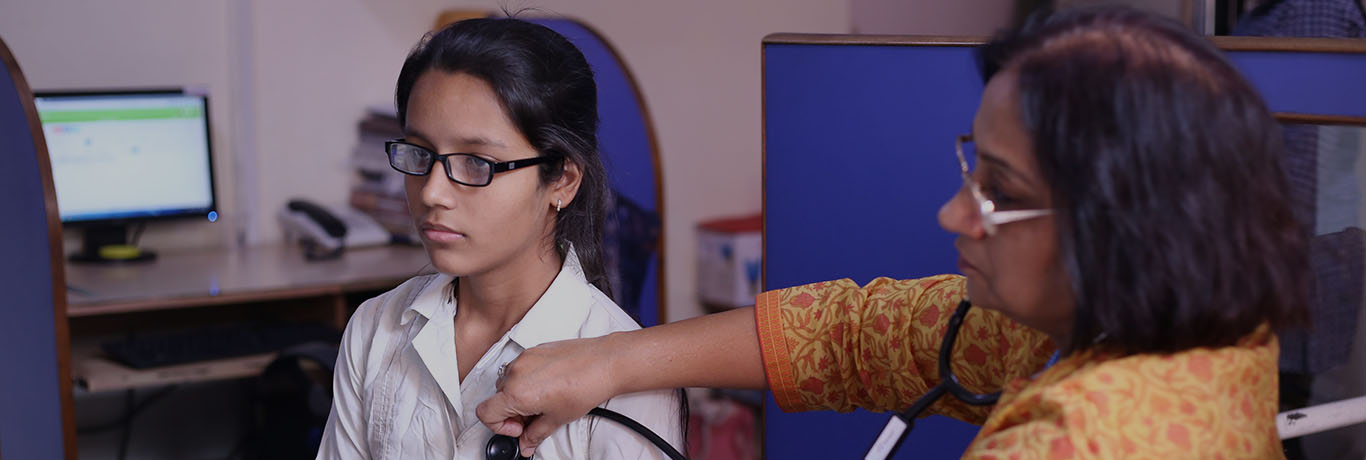
SPS Gurugram provides health services to students to protect and promote health and ensure that every child receives the best medical attention against injuries or emergent medical needs. We have a full-time Doctor and Nurse to look after the children. Individual school health records are maintained within the school clinic for every student. All medical data remains confidential and is stored securely. In the event of any medical emergency, we have systems in place to ensure that the situation is dealt professionally with safely. In case of emergency, a school vehicle takes children to the nearest Hospital.
Services
- Daily OPD
Medical Check-up once a year which involves General Examination, Systemic Examination and Follow-ups
Health Week / Month (April) is celebrated as the Health Awareness Programme.
Wellness Talk/updates from time to time.
Visual Arts

A comprehensive art education provides a rich and engaging curriculum that develops pupils’ abilities to think, reason and understand the world and its cultures. It offers pupil opportunities to respond, perform, and create. Art instils a routine that lasts for lifetime: analytical skills, problem-solving ability, perseverance, and a drive for excellence. The creative skills children develop through art carry them towards new ideas, new experiences, and new challenges, as well as offering personal satisfaction. This is the intrinsic value of our Art Programme.
We believe art gives expressions to our understanding, imagination, and creativity. As the world we inhabit is getting smaller, faster, and more competitive, these qualities are increasingly important. Art is an integral part of a complete, successful, and high-quality education. The study of art enhances intellectual, personal, and social development of today’s youth.
The Six Strands Of The Curriculum Are:
- Drawing which allows creation, expression, clarifying thought and communication.
- Paint and colour which provides an appreciation and understanding of colour leading to expression of experience, interest and imaginative ideas as well as an awareness of colour in their own work like craft and design objects.
- Print encourages a focus on inventive and functional graphic processes.
- Clay gives opportunities to form and change a material imaginatively. Clay is tangible, changeable, under our control in a world that often feels out of our control.
- Construction activities provide opportunities to explore the media of 3-D, balance, and an understanding of the strengths and weaknesses of a particular structure.
- Fabric and fibre encourage the child to explore some of the design processes in craft and appreciate various craft materials. While the development of ideas through imagery provides a balance to other subject areas in the curriculum, the visual arts curriculum must provide challenge and motivation.
The six strands of the visual arts curriculum include the two-strand units: making art and responding to art.
Conference Room & School Auditorium
The decision-accelerator rooms are used for meetings, video conferencing, seminars, debates, workshops, lectures, data presentations, board meetings, in-house meeting, monthly/yearly reviews, conferences of the Managing Committee, staff and students. This spacious hall always pulsates with ideas during knowledge sharing and brainstorming sessions.

Performing Arts

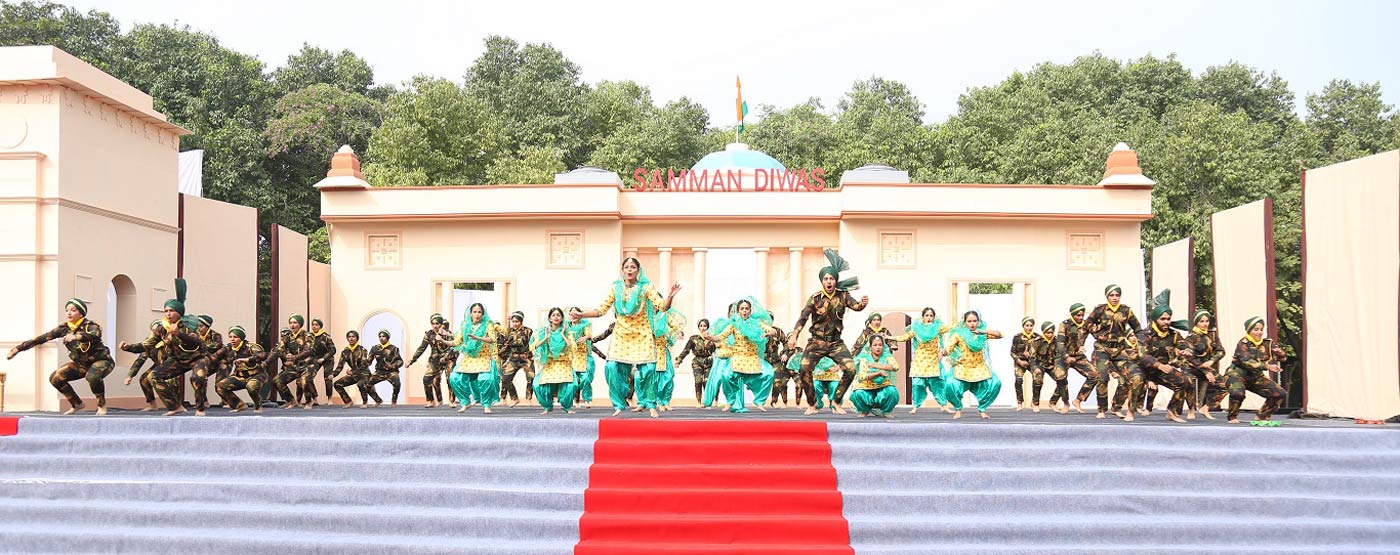
We wish to establish a thriving musical culture in school. A wealth of scientific research over the last decade has proved that music education is a powerful tool for attaining children’s full intellectual, social
and creative potential. Music gives children a means to express themselves to unleash their creativity, and to be inspired by their own boundless capacity for personal growth.
At The Formal Level
Music is compulsory for the first seven years of a pupil’s life in the school from 3+ (Pre-School) to 11 + (Class V). In these critically important years, children are exposed to music every day. The programme is not confined to the more common set of songs or nursery rhymes sung in the traditional fashion, rather the young ones are trained to differentiate simple notations (alankar), rhythm (laya), and beats (tala). Our pre-school orchestra of four-and-five-years old includes 8 simple instruments such as dholak, tambourine, triangle, jhunjhuna kartal, cymbals, dandia and the most ancient of rhythm ‘instrument’ clapping. Between the ages 11+ and 13+ pupils are offered Music as one of the options. Those choosing to pursue Music at this stage master ragas, talas and are knowledgeable about our musicians of today, a brief history of Hindustani and Carnatic styles. They also build up a good collection of different types of songs. For those opting for Music at the advanced stage of Class IX and X under the 10+2 system, the emphasis is on the theory of Music. The standard that they attain is that of diploma from reputed Music Academies.
At The Informal Level
The ‘stuti’ may be in Sanskrit or Hindi and is invariably sung (rather than recited) by a special trained choir. The songs may be a bhajan, a seasonal song, a patriotic song, a folk song, an inspiring song expressing a beautiful thought or a philosophy, Rabindra sangeet, etc. Songs may be in Hindi, Bengali, Bhojpuri, Gujrati, Assamese, Pahari, Marathi, Rajasthani, Malyalam, Telugu, Tamil, Sanskrit etc. The community Shloka with which we end the assembly is usually a thought expressed in four lines, sung by the entire school as one and rendered in simple music.
At the Informal Level among other things, is the morning assembly that consists of
- A Stuti
- Songs
- A community shloka
Playground
Sports plays a vital role in the development of youth. It helps to enhance academic performance, builds higher self-esteem, better psychosocial skills, team building and coping skills and much more.
The sports club of the school offers several activities to the students to choose as per their interest and acumen. The club helps to promote the development of skills and co-ordination through a structured Physical Education Program. Below are the activities offered by the school:
- Volleyball
- Tennis
- Football
- Cricket
- Golf
- Yoga
- Tikowando
- Gymnastic
- Basketball
- Athletics
- Chess
- Table Tennis
- Judo
- Swimming
- Shooting
- School Band
- NCC



Cafeteria

- Our school has a well-ventilated cafe which serves hygienically prepared and nutritionally balanced food. A proper menu is planned for the mid-day meal which is duly checked by the respective teacher in-charge.
Services
- Holistic, Nutritionally Balanced and Hygienic Food
- Mid-Day Meal Facility on request (The form is available at the reception).
- RO installed for Drinking Water
Click here for School Canteen Mid-Day Meal Menu 2024-25
Activity Room - Montessori Wing

“Education is a natural process carried out by the child and is not acquired by listening to words but by experiences in the environment.”
– Maria Montessori.
It is believed that the maximum development and growth of a child’s brain is made in the early years. Young children learn best by experimenting with their environment through hands-on activities and play, which is why learning centers are such a vital part of the preschool.
- Experiential learning brings together observation, creativity, critical thinking and active interaction into early years of education. It allows young learners to enhance their language skills and other social skills.
- Keeping this in mind, an integrated resource lab created where children get hands-on experience for better learning.
The lab provides an opportunity to pre- primary and lower primary students to experience a student-centric hands-on methodology.
Children develop their motor skills by tying and untying laces and bows, zipping and unzipping zippers, and fastening and unfastening buckles.
Sensorial learning is a teaching-learning approach that stimulates the child’s five senses; taste, touch, smell, sight, and hearing. This allows children to use their senses to explore and understand the world around them. Montessori Sensorial Materials are creative tools or toys used in a Montessori classroom that boost the child’s five senses, enabling them to learn better.
Open Gym
Open Gym, a diverse outdoor recreation system, has been installed in the school premises to help students lead an active lifestyle. It has light physical fitness equipment to instil the idea of basic fitness among students. To ensure that any improvement becomes sustainable, the equipment is integrated into structured physical education class on a weekly basis.
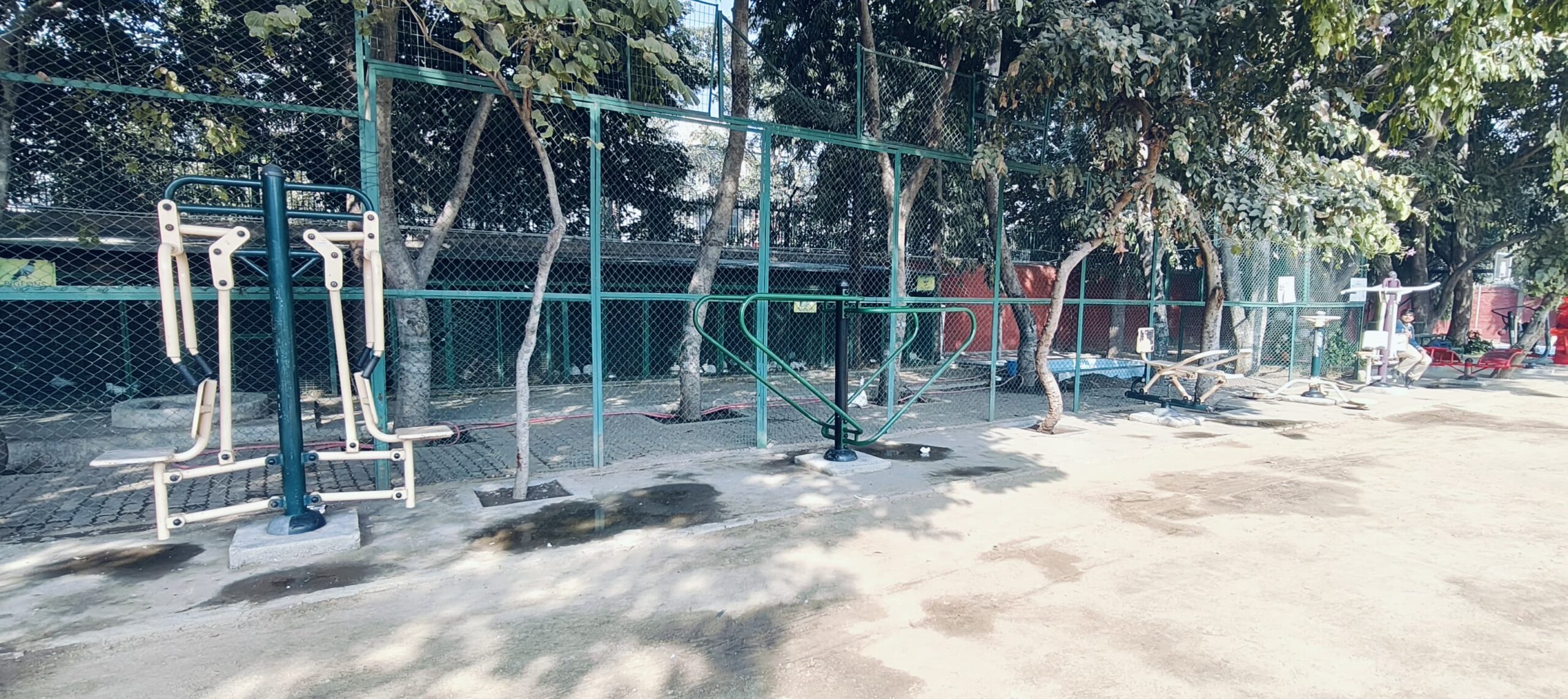
Rain Water Harvesting
In consonance with the vision of UNICEF “safe water and adequate sanitation are as important to quality education as pencils, books and teachers”, the School has implemented one of the most effective rainwater harvesting designs in the internal and external design of school buildings. Sustainable methods and techniques have been followed to ensure water conservation and alternative water use for school facilities.
Rain Water Harvesting does not only educate children about the dire need to preserve drinking water but also encourages a responsible attitude towards the environment and sets a perfect example for the next generation.
School has seven number of Rain Water Harvest System in the campus.
Mini Zoo

“Through the Mini Zoo, the Tiny Tots are made aware of the importance of animals in our environment.”
The Tiny Tots are made aware of our environment. Love for wild life is generated through the pet care project. The animals of this project include ducks, rabbits, parrots, parakeets, a variety of pigeons and fish.
This project has a scientific focus and teaches children about different animals, their life and what they need to stay alive and be well. Pets require love & affection. They are our best companions and you need to treat them well.
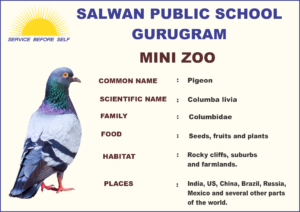
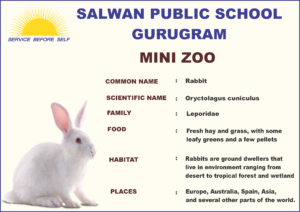

Swimming Pool
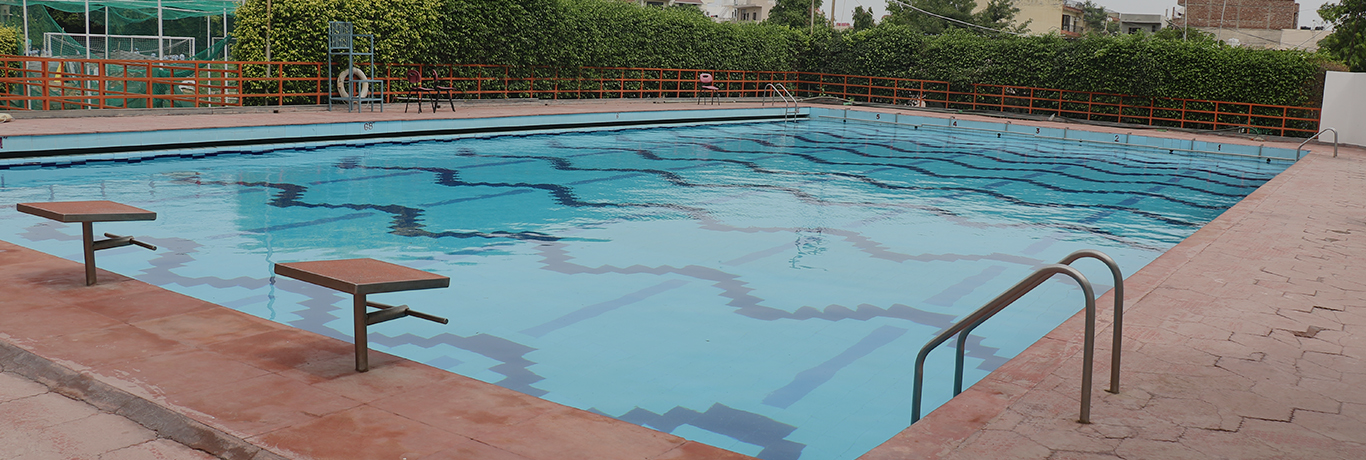
S.No | Description | Details |
1 | Shallow Deep | Start-3.28ft, Mid-3.5ft&4.48ft, |
2 | Length * Width | 25mitre*12.8 Miter |
3 | Water Capacity | 4,16000 Liter |
4 | Number Of Lanes | 5 Lanes |
5 | Sitting Area |
|
6 | Deck Area |
|
7 | All Whether | Heating Pump Will Be |
8 | Technology Used For Pool |
|
Regular swimming classes are held during school hours and after the school hours.
Day Care

We believe that each child is a unique individual with his/her own gift to share. We provide a warm, accepting and nurturing environment where every child grows spiritually, intellectually, socially and emotionally.
The major aim is to provide the children with a secure and supportive environment outside their homes.
The Day care facility is available for the children till class V only. This facility is functional from Monday to Friday and working Saturdays (from 12:30 pm to 5:30 pm). Day care centre remains closed during school holidays & summer vacations.
Transportation
All buses are GPS enabled and have CCTV cameras for the security of children.


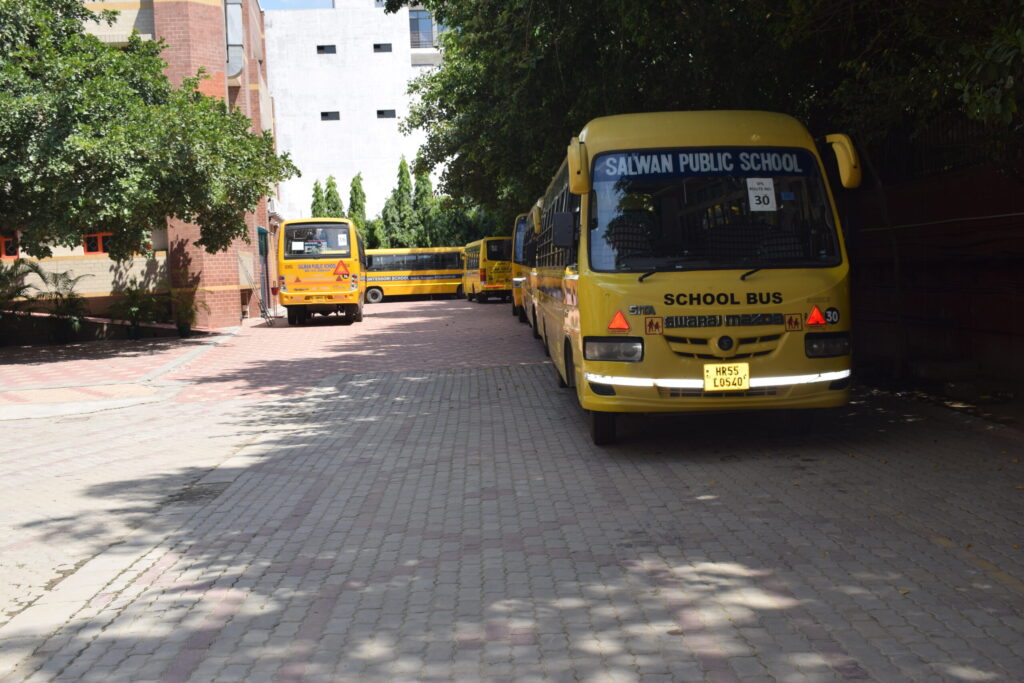
Safety & Security
We understand education and development are important, but nothing matters more than the safety of our children. Our teachers and staff take great care to ensure safety at school by creating a safe and healthy environment that allows children to learn without boundaries - creating a world of endless possibilities for themselves. We have the following measures in place to ensure the safety, health and security of our children.
Staff
- Police verification of all the school staff is undertaken immediately on assuming their duties in the school.
- It is mandatory for support staff to wear a designated uniform and an I-Card. Their attendance is marked at the entry gate, where they are frisked. Meetings of MTS with the Administrative Officer are held every week and with the Principal are held every month.
- Apart from the periodic briefings, trainings and welfare activities are conducted to ensure that they have a sense of belongingness and attachment to the school.
Security
- The campus is secured with Boundary wall so that only authorized staff may enter.
- No child is handed over to any unknown person without written authorization and proper identification.
- Campus is equipped with fire extinguishers.
- All visitors have to fill their details at the school gate and can enter only after a visitor’s pass has been issued to them. In the premises, their movement is restricted to the reception area.
Washrooms
- There is a clear demarcation of washrooms for Students, Female staff and Male staff.
- There are separate washrooms for the MTS and Drivers. Only female attendants are on duty outside the washrooms for students in Class V.
- There are separate attendants for Male and Female washrooms of all the Blocks.
Sensitization & Awareness
- Sensitization fosters a holistic approach to child development, promotes positive school environments, encourages early intervention and support, and strengthens collaboration and communication among all stakeholders.
CCTV & PA System
- CCTVs have been installed at strategic locations in the school such as at the entry gates, corridors and around the building including all the Class-rooms.
- PA system has been installed in the school to disseminate important information and to monitor the classes.
Health Checkup
- The Faculty monitors the child for any symptoms of illness during the day and notifies the parents when their child does not feel well.
- Medical check-ups of children are done by a team of doctors from a reputed Hospital and report is sent to parents.
- We have strict policies for administering medication to children. We require a doctor’s note for any medication, given to a child to ensure his/her safety.
GPS Tracking
To improve the safety and security in the school buses, school has installed the DIMTS (Delhi Integrated Multi-Modal Transit System Ltd.) AIS-140 enabled GPS devices with panic button in all the buses. Parents can track the school buses during route hours of their ward.
Disaster Management
Disaster management focuses on reducing the loss caused by calamity and making people more resilient to disasters. An emergency response system has been established by the School to reduce the vulnerability of such unforeseen circumstances and instill essential lifesaving skills among students.
- A Disaster Management Committee comprising both teachers and students has been constituted to ensure better preparedness.
- Regular safety drills and training programs are conducted to sensitize students, teachers, and other staff members who can respond appropriately to the complications of an actual disaster.
Latest Updates
Visit by Members of International Confederation of Principals
Basic Life Support Training for MTS Staff
Open House Discussion with Ms. Rashmi Malik, School Principal
School Admission
Salwan Public School, Gurugram is a co-educational Senior Secondary School affiliated to CBSE.













